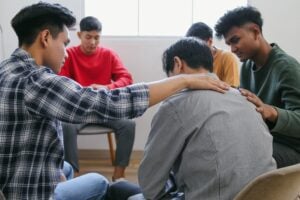Grief and loss are deeply embedded within the human experience. Our mortality means that we all lose people we love and care about during our lives. But although grieving is something we all go through, it can still be an excruciating and life-changing process, and something we shouldn’t go through alone.
Social support, whether from friends, family members, or the broader community, is crucial to coping with grief. It can provide physical and emotional care, from listening to how someone is feeling to supporting them in their search for professional resources.
Social support can be significant between individuals who have shared experiences of grief and loss. When someone experiences a sudden and unexpected death, the grieving process can feel very different from when a death is expected, such as following a long illness. There may not be people they are close to who have had a similar experience, and this can feel isolating and lonely.
So, peer support groups can be significant for people affected by sudden and unexpected death. They bring individuals together who have shared experiences of grief, helping to overcome feelings of isolation and the sense that they are alone in the world. By listening to others’ stories, people can find something that they identify with and share, feeling validated and understood.
These support groups may be for sudden and unexpected death more broadly, or more specifically for death by suicide, the loss of a child, or other grief experiences. For those affected by suicide, peer support groups can help to challenge and cope with the stigma that, sadly, many individuals still experience. There are also peer support groups specifically for young people, fathers, or mothers.
This blog offers some information about peer support services for grief and how they can support people to find themselves and make life manageable after a sudden and unexpected death.
What Is Peer Support?
Peer support brings individuals together who share a common experience or difficulty, allowing them to offer mutual support and build connections with one another. Peer support can take many forms, including face-to-face sessions, phone conversations, and online platforms. It may arise in various settings, including one-on-one conversations, small and large groups, written communications, and healing or memorial services.
Peer support services for sudden or unexpected death may offer regular meetings, such as weekly or bi-weekly peer support groups, where people affected by grief and loss share and listen to one another. Or they may involve home visits by peers in the weeks following a death, to provide support and help connect them with resources. Peer support also takes place through online, moderated forums that include thousands of people.
When Is the Right Time for Peer Support Groups?
Immediately after a sudden loss, people often experience a shock response. They may find it difficult to think clearly or make decisions, and feel completely ungrounded. During this time, listening to others’ stories can be overwhelming and difficult to process.
Support groups also often lead to the formation of new friendships with individuals who share similar needs and require support. Before entering these friendships, it’s important to be able to understand and set your own boundaries about the kind of care you’re able to give. In the aftermath of a sudden death, it can be tough for someone to know themselves well enough to set these boundaries, and these new relationships can be harmful for both people.
This means it’s best to wait until you have experienced some degree of groundedness and self-connection before joining a peer support group. If you’re unsure, you could ask a mental health professional, such as individual or family therapist, for advice.
What Are the Benefits of Peer Support Groups?
Research shows that peer support services can have a significant impact on many different aspects of the grieving process. Studies have found that peer support is linked to:
- a reduced sense of isolation
- fewer grief symptoms
- greater personal growth
- lower anxiety
- a reduction in depression
Peer support groups tend to be most helpful when people have similar experiences of loss. This might include the type of loss, such as the loss of a child or a violent death, but also a person’s background, such as being a father or mother.
Studies show that internet-based support, such as online forums, is also effective in reducing isolation and depression.
How Are Sudden and Unexpected Losses Different from Other Kinds of Grief?
There are many reasons why grieving a sudden and unexpected loss may differ from other grieving processes. Individuals and families that are affected by a sudden death aren’t able to prepare for the loss of their relationship or for any additional roles they may have to fulfil. When a death is violent, it can be more challenging to process because it goes against the fundamental assumption that human life should be protected.
When someone dies by suicide, grieving also involves specific, distinct experiences. People often experience painful and persistent uncertainty about why someone took their own life, and feelings of guilt over whether it could have been prevented. They may also be affected by stigma, which can make it harder for people to grieve in the way they need to. Stigma or uncertainty about how to respond can also cause friends and family to avoid discussing their experience, leading to further isolation and loneliness.
Research has found consistent evidence that sudden and violent losses are a distinct experience from other forms of loss, and are associated with more mental health symptoms and a slower recovery.
The Wave Clinic: Specialist Mental Health Support for Young People and Families
The Wave Clinic provides residential and outpatient mental health treatment services for young people and their families. We specialise in eating disorders, personality disorders, and complex trauma, emphasising the role of the family and community in mental health recovery.
Our programs take a whole-person approach to mental health care, supporting young people to grow in self-confidence, develop life skills, and build lasting relationships. We address the emotions and experiences that underpin mental health symptoms, promoting meaningful, long-term recovery.
If you’re interested in finding out more about our programs, get in touch today.
Fiona Yassin is the founder and clinical director at The Wave Clinic. She is a U.K. and International registered Psychotherapist and Accredited Clinical Supervisor (U.K. and UNCG).
More from Fiona Yassin











